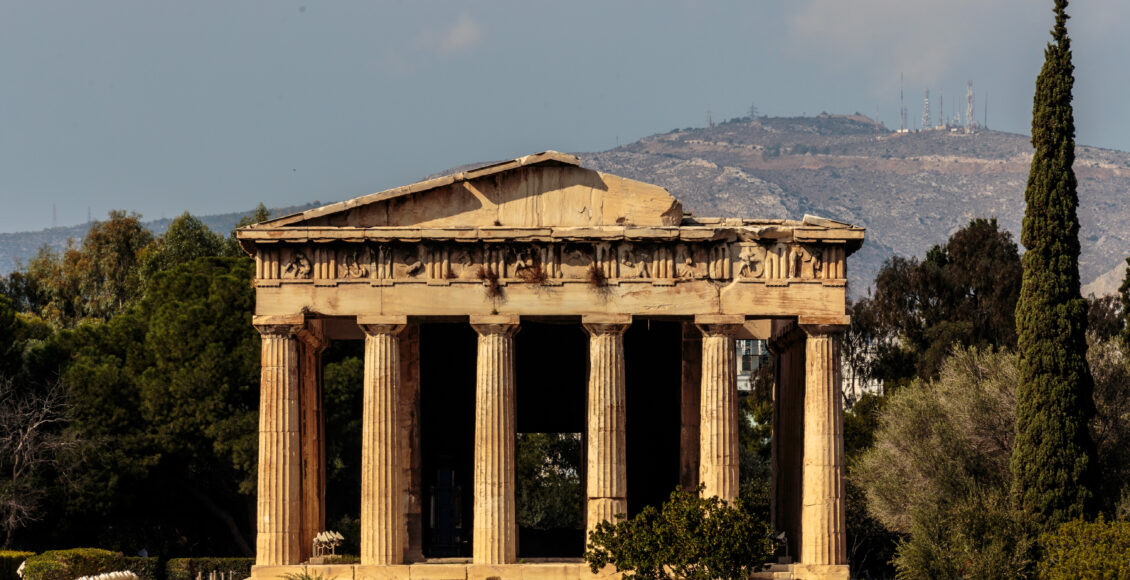PART I: Twitter’s Cage — How Free is its Town Square?
 The Agora in Ancient Greece was a place for townspeople to gather, share, and represent each other’s voices. “Ancient Agora of Athens” by CaptSpaulding is licensed under CC BY-NC-ND 2.0.
The Agora in Ancient Greece was a place for townspeople to gather, share, and represent each other’s voices. “Ancient Agora of Athens” by CaptSpaulding is licensed under CC BY-NC-ND 2.0.
When Elon Musk purchased Twitter last October, he explained his decision in decidedly idealistic terms: he wanted to restore the social media site as the “de facto public town square” of the internet. This was not the first time a leader of the company had used this metaphor to describe Twitter. Back in 2013, then-Twitter CEO Dick Costolo had referred to Twitter as a town square. He drew grand comparisons to the Greek Agora, where citizens of Athens were known to freely meet to discuss the issues of the day: “You came and talked about what was going on in your part of the village, and I came and talked […], and the politician was there, and we listened to the issues of the day.” Twitter, Costolo argued, was the modern iteration of this classical ideal: a place where people of different classes and backgrounds could exchange ideas on an open and levelled playing field. Musk and Costolo differentiated Twitter as something much grander than other social media platforms. They hold Twitter as an essential pillar for debating ideas in a modern democracy. However, it would be irresponsible to take their word for it. As it stands, the current ambiguous algorithm and moderation guidelines fall short of this goal.
The Evolution of Twitter
In seventeen years of existence, Twitter has remained remarkably true to the simple yet revolutionary format first introduced in 2006. Its 140-character format (now 280) enables short, peppy thoughts to be shared instantly with the rest of the world. Since then, it has become a mainstream platform for journalists, politicians, and researchers. Last year, seven-in-ten American journalists reported Twitter as the social platform they use the most for their job. Harvard Shorenstein Center research director, Joan Donovan, emphasized that Musk “wasn’t looking to own a platform. He was looking to buy the social networks that are already on Twitter . . . [the] momentum that Twitter already has built in where culture is created.”
While this may be true for political and information elites, it does not represent the average person. Americans over 50 years comprise only 24 per cent of American adult Twitter users, but they account for almost 80 per cent of all political tweets. Thus, for those that do rely on Twitter for information, Twitter does a poor job of incorporating a diverse range of perspectives into its discourse. In essence, while the label of the town square may apply to those engaged in knowledge production, upon closer examination, the accuracy of the label for the average “townsperson” quickly falls apart.

Co-founder and former Twitter CEO Jack Dorsey at the 2019 TED Conference. “TED2019_20190416_2RL2525_1920” by TED Conference is licensed under CC BY-NC-ND 2.0.
Uplifting Underrepresented Voices
Twitter’s unique networks for civic discourse are seen in how Twitter empowers various marginalized groups. Harvard professor, Nancy Gibbs, highlighted how it became a megaphone for Black journalists and stories — voices underrepresented in mainstream media. As well, Twitter supported local coverage during today’s decline of local news. Despite its shortcomings, Twitter helped supplement the widening gap. It was also behind the rise of significant social movements, such as the #BlackLivesMatter and #MeToo. In 2020, millions of people were mobilized through #JusticeForGeorge and #BlackLivesMatter after George Floyd’s murder, leading to protests globally. Its impact is not limited to movements that start in the United States; the Arab Spring and Iran’s current human-rights protests are just two examples of this. The global reach and accessibility of Twitter is undeniable, as 80 per cent of Twitter users live somewhere other than the US.
Where Twitter Falls Short
Nonetheless, Twitter’s highlights are not without their faults. Its content is skewed towards extremism, as users with such political beliefs have seen their voices disproportionately amplified due to Twitter’s algorithms. Governments and politicians, such as China, have instrumentalized Twitter to spread misinformation. Twitter’s international access has a caveat — it is not truly representative. Only 13 per cent of American adults use Twitter for the news, compared to 31 per cent for Facebook; Facebook appears to be more important concerning political information and discourse than Twitter. Fo20r people with poor Internet access and state censorship, they are prevented from being part of Twitter and its “global town square.” For instance, China and Iran banned Twitter in 2009 to suppress criticism and dissent. In 2016, North Korea banned Twitter to curtail foreigners, as part of the few with Internet access, from sharing information about North Korea. Moreover, Twitter still only represents a minority of the global population. Available data is limited, but some estimate that only 8.9 per cent of all people ages 13 and older are on Twitter.

A rally in a Washington DC public square. “2017.02.25 Rally in Support of Affordable Care Act #ACA” by Ted Eytan is licensed under CC BY-SA 2.0.
Most users are passive consumers rather than active voices in the town square. Twitter’s most ardent users are turning away, reflecting the problem with the town square label. Less than 10 per cent of users are responsible for 90 per cent of tweets. Since 2020, these users have been in “absolute decline.” The Washington Post journalist, Shira Ovide, references the rise of private messaging platforms and community niches as opposed to general discussions with everyone. People are increasingly turning away from Twitter for more manicured content on Reddit, Truth Social, and YouTube. Ovide emphasizes that even Twitter similarly flourished under community niches, such as “Gay Twitter” and “Black Twitter.”
Can Twitter Keep Up?
Although Twitter, for the past decade, had been called a “global town square,” the label quickly falls apart. While Twitter has amplified more voices to reach a wider audience, it does so inconsistently; it is a selective town square representing a minority of the world’s population. Musk and Costolo’s all-encompassing and Western-centric claims risk overshadowing the vast majority of voices that remain underrepresented. At the time of Elon’s purchase, Twitter was already in decline and losing its most ardent users. While Musk’s changes to Twitter since his purchase have been highly reported and scrutinized, it is equally important to note how Twitter has changed prior to Musk’s acquisition. With Musk stepping down only eight months after his purchase of Twitter, his short tenure and Twitter’s uncertain future highlight the importance of looking to Twitter’s past in order to understand the possibilities for Twitter’s future.
Edited by Pascal Hogue
Featured image: The Agora in Ancient Greece was a place for townspeople to gather, share, and represent each other’s voices. “Ancient Agora of Athens” by CaptSpaulding is licensed under CC BY-NC-ND 2.0.
